新人教版八年级上Unit1 Where did you go on vacation2d-3c 导学案
初中英语人教版八年级上册Unit 1 Where did you go on vac

2 ) a lot of “大量的,许多的”,修饰可数名词复数=many, 也可修饰不可数名词,=much如:There are____________/______ books on the desk.The boy eat ________________ /_______ ice cream every day.5.keep in good health=keep healthy保持健康Keep+adj/v-ing 表示“保持某种状态”“一直做。
”We must do more exercises to keep ___________.我们必须多做运动,保持健康。
Don’t keep the children ___________(wait)too long 不要让孩子们等太久了。
【及时反馈,激励评价】I.根据句意和首字母补全单词1.My mother says it's good for my h________.2.Lily e________ every morning to stay healthy.3. I usually watch TV at night, but s________ I go for a walk with my parents.4.I like to d______ coffee.5.We went ______(camp) in the mountains last Summer Vacation.6.We met many ______(difficult) in our English study.7.There were a few people in the library on Sunday,it was ______(crowd) there.8.On my way home,I found a little girl ______(cry) in the corner.9.It was sunny and hot yesterday.We went to the park and ______(fly) kites.II.按要求改写下列各句,每空一词。
初中英语人教版八年级上册Unit 1 Where did you go on vac

anyone, anywhere, wonderful, few, quite a few, most, most of time, Huangguoshu Waterfall, Central Park
• Where did you go on vacation? I went to the mountains. • Did you go with anyone? Yes, I did. No, I didn’t. • Did you do anything special last month? • Huangguoshu Waterfall is very wonderful, so I took quite a few photos.
根据汉语完成英语句子。 1. Brad played sports __________ ________ __________ (大多数时间) last weekend. 2. Did you buy ____________ ______________(一些特别的东西) in India? 3. Li Ming took ____________ __________ ___________ (相当多) photos in Guizhou. 4. Hi, Helen. ________ _______ ________ __________. (好久不见了). 5. Did Julie go out _____________ _____________(和任何人一起)? 6. Did you go _____________ ______________(任何有趣的地方)? 7. Grace went to ____________ ____________ (中央公园) in NewYork City. 8. I was __________ __________ (在度假) last month.
最新人教版英语八年级上册Unit1-Where-did-you-go-on-vacation

A: Grace, where did you go on vacation? B: I went to New York City. A: Oh, really? Did you go with anyone? B: Yes, I went with my mother.
2)如果动词是延续性动词,则一般它即可表示动作,也可 以表示状态。 如:live/stay/work等就是此类。 3)如果是单独的瞬间性动词,则它只表示动作。 如:get up/put on/begin就属于此类。
5. Did you buy anything special? 在英语中,anything, something, nothing 和everything是用 于指代事物的复合不定代词,与之相对应的复合不定代词 anyone, someone, no one 和everyone ( anybody, somebody, nobody 和 everybody) 用于指人。
如visit the Summer Palace----参观颐和园
②visit还可以作名词“拜访,参观”,构成短语
你去哪儿度假了?
--I went to the mountains. 我去了山区爬山。
1) 这是一个特殊疑问句。由“特殊疑问词
+助动词+主语+动词+其它?” 构成。
Hale Waihona Puke 由于是询问已发生的动作(过去的事情),
所以助动词用过去式did, 其后的动词用原形。
e.g. --Where did you go yesterday? 你昨天去了哪儿?
1c Make conversations about the
people in 1a.
人教版英语八年级上册Unit1 Where did you go on vacation
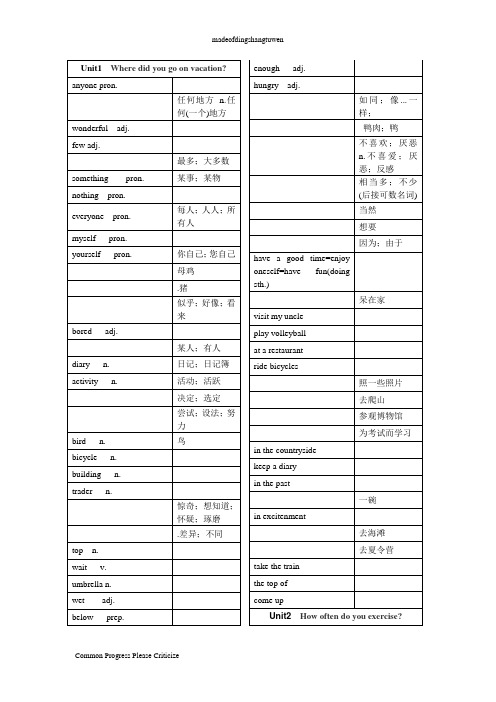
Unit1 Where did you go on vacation? anyone pron.任何地方n.任何(一个)地方wonderful adj.few adj.最多;大多数something pron. 某事;某物nothing pron.everyone pron. 每人;人人;所有人myself pron.yourself pron. 你自己;您自己母鸡.猪似乎;好像;看来bored adj.某人;有人diary n. 日记;日记簿activity n. 活动;活跃决定;选定尝试;设法;努力bird n. 鸟bicycle n.building n.trader n.惊奇;想知道;怀疑;琢磨.差异;不同top n.wait v.umbrella n.wet adj.below prep. enough adj.hungry adj.如同;像...一样;鸭肉;鸭不喜欢;厌恶n.不喜爱;厌恶;反感相当多;不少(后接可数名词)当然想要因为;由于have a good time=enjoyoneself=have fun(doingsth.)呆在家visit my uncleplay volleyballat a restaurantride bicycles照一些照片去爬山参观博物馆为考试而学习in the countrysidekeep a diaryin the past一碗in excitenment去海滩去夏令营take the trainthe top ofcome upUnit2 How often do you exercise?家务劳动;家务事几乎不;几乎没有在任何时候;从来;曾经一次;曾经两倍;两次互联网;因特网满的;充满的;完全的maybe adv. 或许;也许;可能least adj.咖啡;咖啡色健康;人的身体(或精神)状态结果;后果百分之…online adj.television n.穿过;凭借;一直到;以身体头脑;想法;意见;心智together adv.die v..作者;作家牙科医生杂志;期刊然而;不过;无论如何;不管多么比几乎;差不多none pron. less adj.较小的;更小的;更少的;较少的point n.超过;多于;不到;少于至少how oftengo to the dentist看电视每周一次use the Internet对…有好处go online帮忙做家务在周末less thango shoppingread English books熬夜ask sb. about sth.such asgo to the movies 去看电影几乎从不每天three times a week空闲的Unit3 I'm more outgoing than my sister. outgoing adj.更好的;较好的adv.更好地loudly adv.quietly adv.hard-working adj.competition n.fantastic adj.哪一个;哪一些clearly adv.win v.不过;可是;然而虽然;尽管;不过talented adj.truly adv.care v.serious adj.mirror n.必须的;必要的;两者都pron.两者应该;应当触摸;感动到达;伸出;达成;取得联系;(伸手)去够心脏;内心fact n.打碎;折断;违背;解决;中断发笑;n.笑声;类似的分享,共享;分配;共有loud adj.information n.和...不同只要bring out与...同样的事实上;实际上;确切地说类似于;与...相似primary school care aboutUnit4 What's the best movie theater? theater n.使人舒服的;舒适的;seat n.screen n.close v.ticket n.最坏的;最差的cheaply adv.歌曲;歌唱choose v.carefully adv. 小心地,认真地记者新鲜的;清新的舒服地;容易地;充裕地更坏的;更差的服务pretty adv.menu n.act v.meal n.创造的,创造性的;performer n.才能,才艺;常见的;普通的magician n.beautifully adv.winner n.奖品;奖金everybody pron.可怜的;贫穷的seriously给;赠予;送拥挤的有相同特征各种各样;各种类型是…….的职责;由…….决定play a rolemake upfor example认真对待到目前为止;迄今为止电影院in town实现才艺表演be close to欢迎来到get a good prizeUnit5 Do you want to watch a game show?情景喜剧新闻;消息soap n.教育的;有教育意义的计划;方法v.打算;希望;期望;n.希望讨论;谈论standhappen能够;可能,也许预期;期待;盼望comedy n.无意义的;不重要的cartoon n.文化;栽培;教养著名的;有名的appear变成;成为富有的;富饶的;successful adj.might aux.原因;理由common adj.film n.unlucky adj.lose vt.ready adj.character n.简单的;易做的查明、弄清动作片dress up代替;替换工作干得好;做得好对...进行讨论one of看起来像around the world……的象征let sb. do sth.计划、打算做某事希望做某事碰巧做某事盼望做某事做……怎么样?准备做某事尽力做某事one of the main reasonsUnit6 I'm going to study computer science n. 厨师v. 烹饪;煮医生工程师violinist驾驶员,司机pilotpianist科学家college 大学教育药,医学universityLondon文章,论文邮寄,发送决心,决定teamforeignable表示疑问;怀疑;提问;质询意义;意思discuss承诺,诺言beginning改进,改善physicalthemselves自我改进,自我提高hobbyweeklyschoolwork自己的,本人的,拥有个人的,私人的computerprogrammerrelationshipbe sure aboutmake sure长大成长写下关于;与……有关系学着做;开始做同意能够做某事keep on篮球运动员尽某人最大努力make the coccerteam有共同之处different kinds of许下诺言把…寄给…公交车司机擅长于为…制定计划上唱歌课在…的开始Unit 7 Will people have robots?纸污染;污染物 n. prediction 预测future 未来pollute 污染 v.环境planet地球;泥土种植,植物peace海;海洋天空宇航员apartment火箭;空间;太空人的; n.人;人类仆人危险的alreadyfactory相信不同意甚至;愈加shapefallinside可能的不可能存在或发生的;不可能的sideprobably在……期间假日word参与空闲的;免费的big and crowdeduse the subways lesssnake robots空闲时间在25年到50年后study at home oncomputers一百年后more tall buildingsplay a part in…在将来more pollution能够做某事less pollution似乎不可能space station多次;反复地hundreds of突然倒下;跌倒;倒塌寻找;寻求Unit 8 How do you make a banana milkshake?shakeblender剥落;削皮倒;倾倒yogurt蜂蜜watermelon勺,调羹pot增加最后,最终salt糖干酪,奶酪popcorn玉米,谷物机器掘(地);凿(洞);挖(土)hole三明治黄油,奶油turkeylettuce件;篇;片;块;Thanksgiving传统的autumn旅行者英格兰;英国庆祝;庆贺(使)混合;融合pepper(使)从满;装满ovenplate遮盖,盖子,gravy接待,服务温度,气候milk shakepeel bananas多少 + 不可数名词混合在一起忘记做某事……切成……one by oneon special holidays……加到……上two spoons ofcover it with …以很高的温度切碎多少+ 可数名词种树make Russion soupmake beef noodles传统食物the reason for把……放入……remember sb. a cup of yogurtanother 10 minutes一片面包chicken soupgive thanksmany of them接通(电流、煤气、水);打开enjoy rice noodles把……倒进……里Yunnan Rice NoodlesUnit 9 Can you come to my party?预备;准备examflu可得到的;有空的;直到 ... 的时候;直到…为止hang赶上;抓住;捕捉邀请接受;拒绝weekday邀请;邀请函回答,回复forwarddelete 删除print(令人)悲哀的;(令人)难过的再见glad 高兴;愿意准备,准备工作glue没有;不(做某事)惊奇的;感觉以外的housewarmingopeningconcertheadmastereventguest 客人calendar 日历,日程表daytime为……做准备another time闲逛;常去某处前天后天照料;照顾turn down去旅行盼望;期待接到(某人)的信;电话等Unit10 If you go to the party,you 'll have a great time!meetingvideo组织,筹备chocolate难过,失望taxi劝告,建议旅行agentexpert青少年正常的除非,如果不certainlywalletmile生气的,发怒的善解人意的,体谅人的粗心的,不小心的错误,失误他自己小心的,细致的劝告,建议解决;解答step相信,信任信任,经历halfwayelse炸土豆片;炸薯条保守秘密in half在某方面有问题;与某人有矛盾最后;终于。
人教版英语八年级上册_Unit_1_Where_did_you_go_on_vacation教材全解
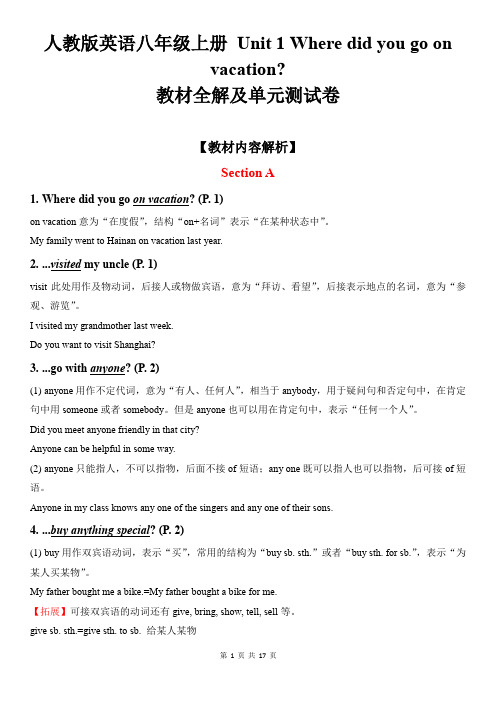
人教版英语八年级上册Unit 1 Where did you go onvacation?教材全解及单元测试卷【教材内容解析】Section A1.Where did you go on vacation? (P. 1)on vacation意为“在度假”,结构“on+名词”表示“在某种状态中”。
My family went to Hainan on vacation last year.2....visited my uncle (P. 1)visit此处用作及物动词,后接人或物做宾语,意为“拜访、看望”,后接表示地点的名词,意为“参观、游览”。
I visited my grandmother last week.Do you want to visit Shanghai?3....go with anyone? (P. 2)(1)anyone用作不定代词,意为“有人、任何人”,相当于anybody,用于疑问句和否定句中,在肯定句中用someone或者somebody。
但是anyone也可以用在肯定句中,表示“任何一个人”。
Did you meet anyone friendly in that city?Anyone can be helpful in some way.(2)anyone只能指人,不可以指物,后面不接of短语;any one既可以指人也可以指物,后可接of短语。
Anyone in my class knows any one of the singers and any one of their sons.4....buy anything special? (P. 2)(1)buy用作双宾语动词,表示“买”,常用的结构为“buy sb. sth.”或者“buy sth. for sb.”,表示“为某人买某物”。
My father bought me a bike.=My father bought a bike for me.【拓展】可接双宾语的动词还有give, bring, show, tell, sell等。
新人教版八年级上册英语unit 1 where did you go on vacation

Unit 1 Where did you go on vacation?Section A 1a—2d【学习目标】1、学会谈论过去发生的事件—学习一般过去时的用法2、掌握规则动词的变换规则3、熟记一些常用的不规则动词一、知识衔接1.带有确定的过去时间状语时要用过去时。
如:two days ago…、last year 、just now、when I was 8 years old 、yesterday ···eg: Did you have a party yesterday?2 表示过去连续发生的动作时要用过去时. 这种情况下,往往没有表示过去的时间状语,而通过上下文来表示。
The boy opened his eyes for a moment,looked at the captain and then died.3 表示过去一段时间内经常或反复的动作常与always、never 等连用。
Mrs. Peter always carried an umbrella. 彼得太太过去老是带着一把伞。
二、自主检测1①待在家②去海滩③去夏令营④去山区⑤去度假⑥任何特殊的东西⑦任何有趣的人⑧任何有趣的地方2.①look__________ ②play___________ ③live____________ ④hope__________⑤get __________ ⑥shop__________ ⑦study _________ ⑧am_________⑨is ⑩are________ ⑪take ⑫do三、小组合作Task 1、学生两人一组展示活动,轮流介绍自己去过的一个地方,如:I went to Beijing/ the Great wall /went to the park etc.Task 2、学生两人一组编对话讨论假期活动A:Where did you go on vacation?B:I went to the mountains.【达标练习】A、单项选择1.---What did you do on vacation?----I____ to New York City.A. goB. goingC. wentD. goes2. They helped me_______my books.A. findedB. findC. foundD. finding3. What____ you ___ last night?A. did. DoB. do, doC. did , doingD. are, do4. ----Where did she go on vacation?----She ___ to the beach.A. goB. goesC. wentD. going5. Did he go to Central Park?Yes, he_____.A. didB. didn’tC. doD. doesB、1. Tom and Mary ___________ (come) to China last month.2.Mike ___________(not go) to bed until 12 o’clock last night. So he_______(get ) up late.3.Mary __________ (read) English yesterday morning.4.There _________ (be) no one here a moment ago.5.I ___________ (call) Mike this morning.6.I listened but ___________ (hear) nothing.7.Tom ___________ (begin) to learn Chinese last year.st week we _________ (pick) many apples on the farm.9.My mother ________________ (not do) housework yesterday.10. She watches TV every evening. But she __ (not watch) TV last night.C、用括号内动词的正确形式填空Last year Mr. Smith _______ (go ) to China and Japan. He_________ (have) a wonderful time. He________ (do) a lot of different things and________ (talk) to a great number of different people. He_________(eat) Chinese and Japanese food and________(visit) a lot of interesting places. When he_________(go) back to England, he ________ (be) very tired.Section A 3a-3c【学习目标】1、一般过去时的一般疑问句和答语。
人教版八年级英语上册 Unit 1 Where did you go on vacation_
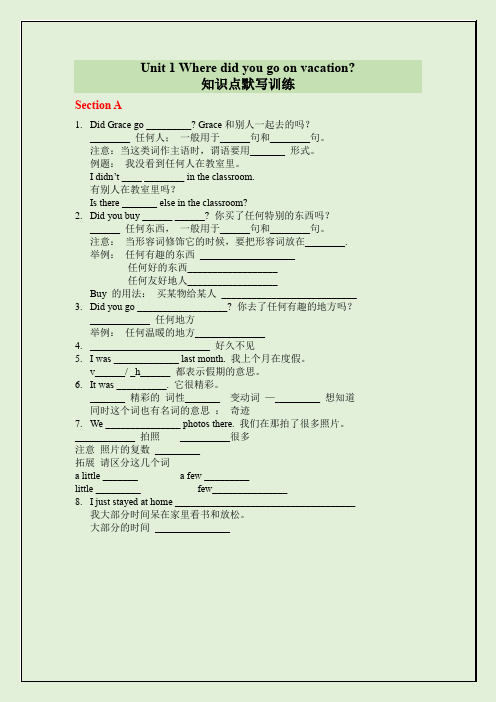
Unit 1 Where did you go on vacation?知识点默写训练Section A1.Did Grace go _________? Grace和别人一起去的吗?________ 任何人;一般用于______句和________句。
注意:当这类词作主语时,谓语要用_______ 形式。
例题:我没看到任何人在教室里。
I didn’t ____ ________ in the classroom.有别人在教室里吗?Is there _______ else in the classroom?2.Did you buy ______ ______? 你买了任何特别的东西吗?______ 任何东西,一般用于______句和________句。
注意:当形容词修饰它的时候,要把形容词放在________.举例:任何有趣的东西___________________任何好的东西__________________任何友好地人__________________Buy 的用法:买某物给某人___________________________ 3.Did you go __________________? 你去了任何有趣的地方吗?____________ 任何地方举例:任何温暖的地方______________4.________________________ 好久不见5.I was _____________ last month. 我上个月在度假。
v______/ _h______ 都表示假期的意思。
6.It was __________. 它很精彩。
_______ 精彩的词性_______ 变动词—_________ 想知道同时这个词也有名词的意思:奇迹7.We _______________ photos there. 我们在那拍了很多照片。
____________ 拍照__________很多注意照片的复数_________拓展请区分这几个词a little _______ a few _________little _________few_______________8.I just stayed at home ____________________________________我大部分时间呆在家里看书和放松。
人教版英语八上Unit 1 Where did you go on vacation讲义

Unit1 Where did you go on vacation?一、重点词汇及拓展1. anyone pron.任何人anyone interesting 任何有趣的人e.g. Did you meet anyone interesting? 你有遇到任何有趣的人吗?2. anywhere adv. 在任何地方e.g. An accident can happen anywhere. 任何地方都可能发生事故。
3. wonderful adj.精彩的,绝妙的wonder n. 奇迹v. 好奇wonderfully adv. 精彩地e.g. The food was just wonderful. 食物非常好吃。
4. few adj. & pron. 不多,很少(否定含义)little 不多,很少(修饰不可数名词)quite a few 不少fewer较少的fewest 最少的e.g. It only took a few seconds. 那只需要几秒钟。
5. quite a few 相当多,不少e.g. Quite a few people know that. 有不少人知道。
6. most adj.& adv. & pron.最多,大多数e.g. Most people live in the city. 大多数人生活在城市。
7. something pron. 某事,某物something useful 有用的东西something else 其他事物e.g. I have something in my eyes. 我眼睛里进东西了。
8. nothing pron. 没什么nothing to do 无所事事nothing much 很少nothing but 只有e.g. Money means nothing to him. 钱对于他毫无价值。
9. everyone pron. 每个人,有人e.g. Everyone has a chance to win. 每个人都有获胜的机会。
人教版八年级英语上册:Unit1 Where did you go on vacation-讲义(含答案).doc
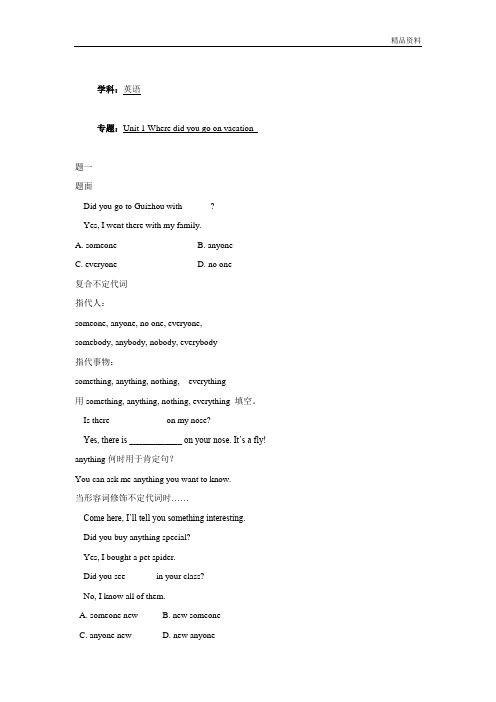
学科:英语专题:Unit 1 Where did you go on vacation题一题面---Did you go to Guizhou with ______?---Yes, I went there with my family.A. someoneB. anyoneC. everyoneD. no one复合不定代词指代人:someone, anyone, no one, everyone,somebody, anybody, nobody, everybody指代事物:something, anything, nothing, everything用something, anything, nothing, everything 填空。
---Is there ____________ on my nose?---Yes, there is ____________ on your nose. It’s a fly! anything何时用于肯定句?You can ask me anything you want to know.当形容词修饰不定代词时……---Come here, I’ll tell you something interesting.---Did you buy anything special?---Yes, I bought a pet spider.---Did you see ______ in your class?---No, I know all of them.A. someone newB. new someoneC. anyone newD. new anyone题二题面I __________________ my uncle on vacation.我在假期去看望了叔叔。
I visit my grandparents once a week.我每周都去______ 爷爷奶奶一次。
人教新目标八年级上册英语《Unit 1 Where did you go on vacation?》

人教新目标八年级上册英语《Unit 1 Where did you go on vacation?》Section B_教学设计2一. 教材分析人教新目标八年级上册英语《Unit 1 Where did you go on vacation?》Section B 主要包括两部分内容:一是听力练习,二是口语交际。
通过本节课的学习,学生能够掌握一般过去时的疑问句和回答,学会用英语询问他人的假期经历,并能用一般过去时进行回答。
教材内容丰富,贴近学生生活,有利于激发学生的学习兴趣。
二. 学情分析八年级的学生已经掌握了部分英语语法知识,具备一定的听说读写能力。
但学生在使用一般过去时方面还存在困难,需要通过大量的练习来巩固。
此外,学生对于描述自己和他人的假期经历可能感到无从下手,需要教师在课堂上进行引导和鼓励。
三. 教学目标1.知识目标:学生能够掌握一般过去时的疑问句和回答,学会用英语询问他人的假期经历,并能用一般过去时进行回答。
2.能力目标:学生能够听懂、会说、会写本节课的重点词汇和句型。
3.情感目标:通过本节课的学习,学生能够增进与同学之间的友谊,分享彼此的假期经历。
四. 教学重难点1.重点:一般过去时的疑问句和回答,以及本节课的重点词汇和句型。
2.难点:如何运用一般过去时描述自己和他人的假期经历。
五. 教学方法1.任务型教学法:通过设置各种任务,让学生在完成任务的过程中学会运用所学知识。
2.交际法:鼓励学生进行口语交流,提高学生的交际能力。
3.情境教学法:创设各种情境,让学生在真实的环境中学会使用英语。
六. 教学准备1.教师准备:准备好课件、听力材料、相关图片等教学资源。
2.学生准备:预习本节课的内容,准备好相关的词汇和句型。
七. 教学过程1.导入(5分钟)教师通过提问学生“What did you do last weekend?”引出本节课的主题“假期经历”。
引导学生用英语表达自己的假期经历,激发学生的学习兴趣。
人教版八年级英语上册:Unit1 Where did you go on vacation-讲义(含答案).doc
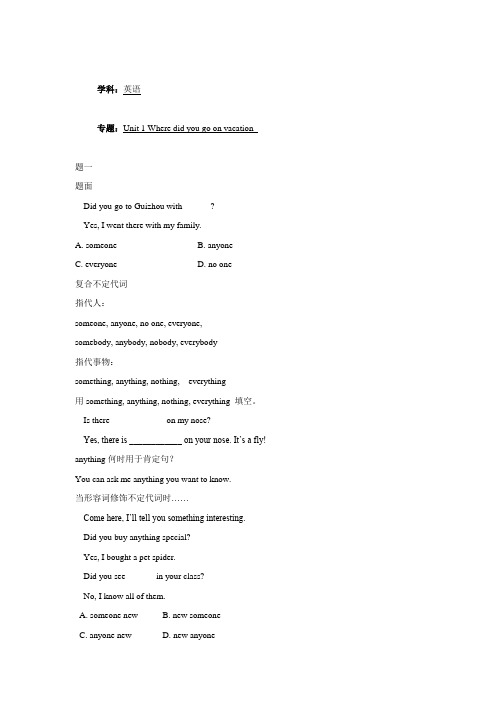
学科:英语专题:Unit 1 Where did you go on vacation题一题面---Did you go to Guizhou with ______?---Yes, I went there with my family.A. someoneB. anyoneC. everyoneD. no one复合不定代词指代人:someone, anyone, no one, everyone,somebody, anybody, nobody, everybody指代事物:something, anything, nothing, everything用something, anything, nothing, everything 填空。
---Is there ____________ on my nose?---Yes, there is ____________ on your nose. It’s a fly! anything何时用于肯定句?You can ask me anything you want to know.当形容词修饰不定代词时……---Come here, I’ll tell you something interesting.---Did you buy anything special?---Yes, I bought a pet spider.---Did you see ______ in your class?---No, I know all of them.A. someone newB. new someoneC. anyone newD. new anyone题二题面I __________________ my uncle on vacation.我在假期去看望了叔叔。
I visit my grandparents once a week.我每周都去______ 爷爷奶奶一次。
- 1、下载文档前请自行甄别文档内容的完整性,平台不提供额外的编辑、内容补充、找答案等附加服务。
- 2、"仅部分预览"的文档,不可在线预览部分如存在完整性等问题,可反馈申请退款(可完整预览的文档不适用该条件!)。
- 3、如文档侵犯您的权益,请联系客服反馈,我们会尽快为您处理(人工客服工作时间:9:00-18:30)。
Unit1 Where did you go on vacation? Section A 2d-3c
【学习目标】
1、一般过去时的特殊疑问句及答语。
Where did you/he/she/they go on vacation?
She went to the beach.。
2、学习巩固复合不定代词的用法
【重难点】
1、能用英语自由谈论活动
2、能正确运用不定代词无论在口头表述或书面表达。
【预习指导】Independent learning
自学课本P2-P3,完成下列任务。
一、先学一学。
★★(知识库)
合成不定代词和不定副词的构成及其用法
1.构成:由some, any, no, every分别加上-body, -thing, -one构成的不定代词叫做合成不定
代词;加上-where构成副词。
2.用法:
(1)合成不定代词在句中可以作主语,宾语或表语等。
Nobody will listen to him.
He wants something to eat.
(2)不定代词作主语时,谓语动词要用单数。
There is nothing wrong with the TV.
Everybody likes to be free.
(3)some-不定代词,通常用于肯定句中;any-不定代词则多用于否定句、疑问句和条件状语从句中。
但some-可用于表请求、邀请、预料对方会作肯定回答时的疑问句中。
Someone called on her last week.
There isn’t anyone else there.
Is anybody over there?
Could you give me something to eat?
(4)形容词修饰不定代词时,通常要放在不定代词之后。
There is something wrong with your eyes.
二、试一试。
学完知识库请你来完成书上的3a和3b。
★★
三、译一译。
★
go with someone_________ go out with someone _______
study for tests_____ ___ long time no see_________
keep a diary________ take quite a few photos________
【合作探究】Cooperation,exchange and show
Step1 Role-play the conversation
1.Listen and repeat .
2.Give time to role-play it.
Step2 Show time
1.call one student to read the words in 3a in the box,and say out their meanings
2.one pair reads the conversation.
3. underline some phrases:
4.read the conversation aloud by the students,then act out it with books closed
5.check the answers in 3b, then find some useful phrases.
6. Recite 3b in two minutes.
Step3 Report
1.Ask questions in groups
2.Tell the class their results
【当堂检测】Progress
用不定代词或不定副词填空:
1. I can’t hear anything = I can hear _________.
2. There is __________ on the floor. Please pick it up.
3. Did _____ go to play basketball with you ?
4. I phoned you last night, but ________ answered it.
5. I don’t think ___________ telephoned.
6. Why don’t you ask _________ to help you ?
7. If you want __________ , please let me know.
8. Shall we get _________ to drink ?
9. Don’t worry. There’s ______ wrong with your ears.
【回家作业】Homework
1.背出2d 的对话
2.完成作业本(二)和第三课时导学案
【总结】Summary
本节课你掌握了哪些内容,请写一写。
Phrases:
Drills:。
